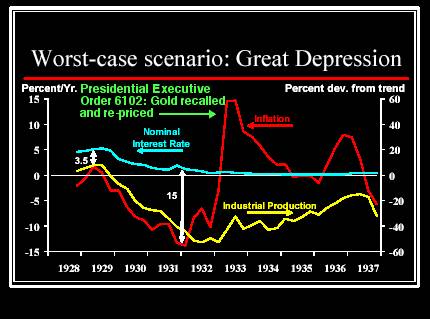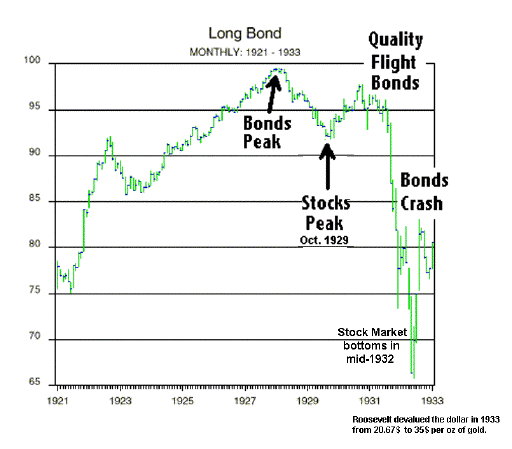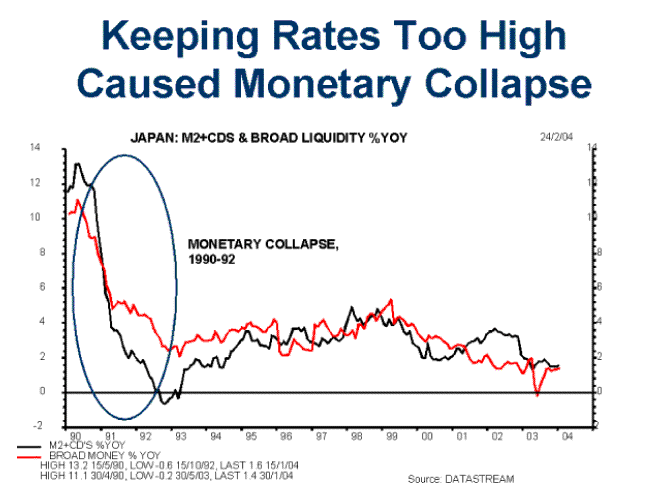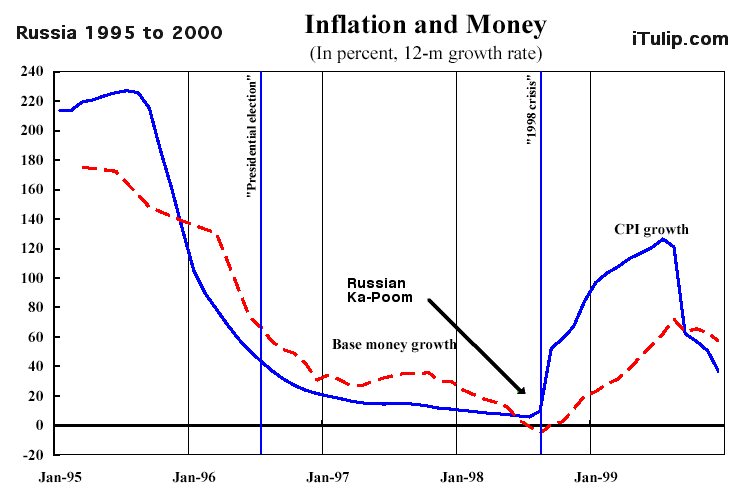This is not (or certainly should not be) a "theological position" one way or the other. We had all better be agnostics while examining these events. I'm interested in what iTuliper's think. I will of course be among the applauders of the most withering demolitions of Mr. Crooks' assertions!  This guy is not bad at calling the currency bit moves. I have another advisor, who I would earnestly like to dump in January - who is calling a scenario much like Mr. Crooks! USD is in the very baby steps of embarking on a *very long* uptrend.
This guy is not bad at calling the currency bit moves. I have another advisor, who I would earnestly like to dump in January - who is calling a scenario much like Mr. Crooks! USD is in the very baby steps of embarking on a *very long* uptrend.
Just so we can get a sense of what this other guy is saying, he's talking about a *multi-year* breakout in the USD, with consequent mirror opposite re-arrangement of a dozen other macro calls. Now it looks like people like Richard Russell and also Jack Crooks are beginning to drink that kool-aid too.
We iTulipers look at the landscape and have a powerful urge to consign such babblers to the "retarded" category. I know I do looking at the US fundamentals. But cleverly, Mr. Crooks is saying "don't look at the US, look at all the rest, which are the second half of the USD equation, and he's got at least an argument there. So maybe if a few other iTulipers contribute arguments as to precisely why this is not in the cards we can "stress test" the iTulip consensus to the contrary here? C'mon guys. I'm looking for some really tough bullet-proof arguments as to why Mr. Crooks has it all wrong this time.
Please contribute your arguments pro or con. Is Mr. Crooks a "naive ingenue" or is he an astute detective here? (Finster has already deposited some hints of his own views, which were definitely "food for thought"!) Anybody else got an idea whether Mr. Crooks may have been hanging out with the Martin D. Weiss [Phd.] group a little too long here? :rolleyes:
QUOTES:
If global demand is tanking, if global credit is receding, if commodities prices fall, then this great inflationary environment can’t possibly overwhelm us, right? I believe a financial system clogged with debt repudiation makes global deflation a far greater danger. I’ll explain this looming deflation scenario a side article that follows. Central banks can pump out money all they want, but if the financial institutions are using the money to save themselves and consumers are shoring up their own balance sheets and business see fewer decent capital investment prospects, then this money is not stimulative. In this environment, we expect central banks to aggressively cut interest rates. In reality, they will be playing catch-up to the U.S. Fed, which has already made significant strides in cutting back the cost of borrowing. What does this mean?
quickly. Falling stocks will reinforce this trend. Looking at a chart of the Dow Jones World Stock Index Weekly I’d guess a major top is in place, and we are clearly entering a major bear market. We are already hearing howls from those that say it isn’t fair. It isn’t fair the U.S. dollar could benefit by being the cause of much of the problems now in the global economy. But the same crowd never thought of fair when the world’s money was funding risky asset investments and blowing bubbles of dubious wealth around the globe. I think we may be in the midst of what the economists wanted — global rebalancing. U.S. exports grew faster than did China over the last 12 months. The U.S. Current Account is improving. The U.S. consumer is buying less and saving more. Commodities prices are on the verge of breaking down even further.
 This guy is not bad at calling the currency bit moves. I have another advisor, who I would earnestly like to dump in January - who is calling a scenario much like Mr. Crooks! USD is in the very baby steps of embarking on a *very long* uptrend.
This guy is not bad at calling the currency bit moves. I have another advisor, who I would earnestly like to dump in January - who is calling a scenario much like Mr. Crooks! USD is in the very baby steps of embarking on a *very long* uptrend. Just so we can get a sense of what this other guy is saying, he's talking about a *multi-year* breakout in the USD, with consequent mirror opposite re-arrangement of a dozen other macro calls. Now it looks like people like Richard Russell and also Jack Crooks are beginning to drink that kool-aid too.
We iTulipers look at the landscape and have a powerful urge to consign such babblers to the "retarded" category. I know I do looking at the US fundamentals. But cleverly, Mr. Crooks is saying "don't look at the US, look at all the rest, which are the second half of the USD equation, and he's got at least an argument there. So maybe if a few other iTulipers contribute arguments as to precisely why this is not in the cards we can "stress test" the iTulip consensus to the contrary here? C'mon guys. I'm looking for some really tough bullet-proof arguments as to why Mr. Crooks has it all wrong this time.
Please contribute your arguments pro or con. Is Mr. Crooks a "naive ingenue" or is he an astute detective here? (Finster has already deposited some hints of his own views, which were definitely "food for thought"!) Anybody else got an idea whether Mr. Crooks may have been hanging out with the Martin D. Weiss [Phd.] group a little too long here? :rolleyes:
QUOTES:
Global Deflation Looms [ :eek: :eek: :eek: ]
It surprises me to see how many have bought into the hyperinflationary theme. The best I can tell, them become wrapped around central bank easy-money policies and conspiracy in the government’s economic reports. The Austrians would say it is credit that matters. That is how you can decide between inflation and deflation. And as far as I can tell, we are pretty much locked in a credit repudiation stage for a while to come. The Fed can dish out money, but if the banks don’t lend, or no one shows up to borrow, it doesn’t matter. This is exactly what I see happening right now.
And the impact is deflationary.
Recall a little problem like this lasted for about 14 years in Japan. Even with the Bank of Japan’s famous, Zero Interest Rate Policy (ZIRP), no one showed up to borrow as debt was being worked off. Put another way, you can a lead horse to water but you can’t make him buy a new car. Or as our deep-thinking government sees it, you can dish out taxpayer money and they will all run to the nearest mall.
Sorry, but “Nope!” I wonder if there is anyone in the current administration who’s ever heard of a guy named Milton Friedman: “There is no such thing as a free lunch.” Tumbling wealth — notably in homes and stocks — coupled with job concerns makes people nervous. When they are nervous, they don’t spend as much. They save more. Of course, savings is a dirty word in a consumer demand driven world. Even though it is ultimately the pool of accumulated savings properly allocated to the free market and the entrepreneur that makes a country wealthy.
Many economists and other critics lament that U.S. consumers don’t save — the Chinese do. I would argue the massive investment in mutual and money market funds by U.S. citizens indicates we DO save. We just don’t save in banks, as do the Chinese prisoners (citizens). They tend to use banks because there are so few alternatives available to them — their money is locked in China, just as they are. This “forced savings” conveniently represents a ready pool of capital for Chinese manufacturing growth. Maybe as alternatives open up, and the Chinese move money into mutual funds etc., their savings pattern will begin to look more Western over time.
I am not arguing the average U.S. citizen didn’t go on an incredibly irresponsible spending binge funded by consumer credit — Mr. Consumer definitely did. What I am saying is that now Mr. C will likely be extracting some “savings” held in the form of mutual fund investment and likely start to build real savings that the economists can label as such — this will of course be deflationary as it reduces the pool of collateral, the stock market is still a very big collateral pool, for lending and investment. And in a world of massive malinvestment, thanks to massive amounts of manufactured derivative credit, this future savings at both the consumer and institutional level will be part and parcel of the work-off of this malinvesment. This assumes the market works its cleansing magic despite our trusty government officials impeding it every step of the way.
At this stage in the cycle, a natural market cleansing process is the most efficient (and painful) and deflationary.But there seems an overwhelming wallow from the collective for nanny government to save the economy from pain. Sadly! Why is deflation such a boogie man? Because there is no place to hide for the inefficient, over indebted, and those cocky crony capitalists who seem to love the “free” market on the way up (and take credit for success), but scream for help on the way down. Deflation restores real value to its rightful place. It tends to boost the value of money relative to goods, i.e. increasing general purchasing power for those with cash balances. It allows the most efficient users of scarce capital to survive, and those propped up by artificial manipulation of the rate of interest and crony capitalism to die — as it should be.
We don’t have to have a crash. But the economics in my mind point more toward deflation over inflation — as heretical as that may sound.
_______________
Dollar Bullish Implication #1: Draining of Global Capital
It’s all part of money flowing from the center to the periphery and now back to the center again. Let me elaborate ...
The developed world provides the capital for the rest of the world. I like to think of it as the center to the periphery, i.e. credit created in the most efficient and deepest capital markets is used to fund investment (risky and otherwise) to markets outward on the periphery — those markets that don’t have their own domestic capital markets ready and available to do the job. Therefore, when money starts to move out of the periphery (that which is still left possibly after systemic shock) and back to the center, the dominant receiver of this flow back to the center is the U.S. capital market. That’s why receding global credit is dollar bullish. Because the supply of the world’s money, the U.S. dollar, is falling, boosting its value.
_______________
_______________
Dollar-Bullish Implication #2: The Commodity See-Saw
I’m talking about the consequences of the Big Four’s declining demand as it impacts the demand for commodities. Logically, one would think there is little chance of current prices for energy and industrial metals (and gold) to be sustained. Of course, thinking “logically” has the potential to get us into trouble in a world often dominated by illogical players. But if these commodities served as hiding places for money fearing a U.S. dollar meltdown, then you’d have to think money eventually leaving this asset class, for whatever reason, must be dollar-bullish. And sticking to that theme, I am gaining more confidence in my theory that the fall in crude means a rapid closing of the “Oil/Dollar Carry Trade” — borrowing dollars to fund purchases of crude oil and paying back the dollar loans at cheaper rates in the future. Basically, this becomes a classic self-reinforcing process …
_______________
... Lack of global credit leads to slowing global growth ... leads to slowing oil demand
... leads to more closing of the Crude Carry Trade ... leads to change in dollar sentiment ...
leads to new price trend led by short-term players ... and leads to capitulation to the trend on the part of dollar perma-bears …
Ultimately, as this trade closes, money flow benefits the dollar — big time.
_______________
Dollar-Bullish Implication #3: Shifting Interest-Rate Policies
If global demand is tanking, if global credit is receding, if commodities prices fall, then this great inflationary environment can’t possibly overwhelm us, right? I believe a financial system clogged with debt repudiation makes global deflation a far greater danger. I’ll explain this looming deflation scenario a side article that follows. Central banks can pump out money all they want, but if the financial institutions are using the money to save themselves and consumers are shoring up their own balance sheets and business see fewer decent capital investment prospects, then this money is not stimulative. In this environment, we expect central banks to aggressively cut interest rates. In reality, they will be playing catch-up to the U.S. Fed, which has already made significant strides in cutting back the cost of borrowing. What does this mean?
It means the U.S. dollar yield disadvantage could narrow rather quickly. And you guessed it: an improving dollar yield differential is a huge positive for the dollar.
_______________
Dollar-Bullish Implication #4: Stocks Becoming a Catalyst
Last but not least is the impact on credit from the world’s largest depository of collateral for loans — the stock market. In other words, falling stocks speed the process of credit draining from the economy, and it has broader psychological impact to boot. Institutions and individuals lose a key source of wealth and major source of collateral value to support existing loans. Financial institutions already in “save-thyself mode” are calling loans more
quickly. Falling stocks will reinforce this trend. Looking at a chart of the Dow Jones World Stock Index Weekly I’d guess a major top is in place, and we are clearly entering a major bear market. We are already hearing howls from those that say it isn’t fair. It isn’t fair the U.S. dollar could benefit by being the cause of much of the problems now in the global economy. But the same crowd never thought of fair when the world’s money was funding risky asset investments and blowing bubbles of dubious wealth around the globe. I think we may be in the midst of what the economists wanted — global rebalancing. U.S. exports grew faster than did China over the last 12 months. The U.S. Current Account is improving. The U.S. consumer is buying less and saving more. Commodities prices are on the verge of breaking down even further.
And inflation will be squeezed out of the developed world’s economies no matter what central bankers decide to do. Maybe rebalancing is what is needed to cleanse a global financial system chock full of malinvestment. I think it will be a very painful process. But I also think it will usher in a major long-term bull market for the U.S. dollar.
 )
)




Comment